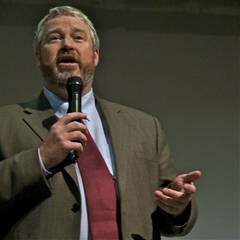 Mayor Mike McGinn
Mayor Mike McGinn
When the Seattle mayoral election was finally decided last night, after King County Elections dutifully counted up the votes, Joe Mallahan graciously conceded, and Governor Gregoire announced she was looking forward to working with the new mayor.
It sounded like business as usual, but Mike McGinn’s election was the biggest upset victory in Seattle politics in more than three decades. This was the 1980 U.S. hockey team over the Soviets, Truman over Dewey, David versus Goliath. It was an epic long shot and it shakes Seattle politics to its very core.
Seattle is no Chicago, but we have our own version of the political machine. Business, plus labor, plus the Democratic Party equals victory.
Mallahan won endorsements from state Democrats, the Governor, the Seattle Chamber of Commerce and its political arm the Alki Foundation, big business and labor. McGinn won the election.
Mallahan outspent McGinn by a 3.5-to-1 margin. Mallahan loaned his own campaign about as much as McGinn received in total. McGinn won the election.
Now, Seattle’s traditional powers-that-be are scrambling to figure out just how it all happened. All the money, all the powerbrokers, and all the political muscle didn’t deliver the knockout punch. There are all sorts of theories.
McGinn was helped by Mallahan’s complete ineffectiveness in debates. Mallahan struggled to get two thoughts together in a coherent fashion. In nearly every debate, he bobbled the easiest questions and completely missed on the major issues. The fact that McGinn’s lead increased as the counting went on suggests that the late voters broke for him, not Mallahan. Seems the longer Joe talked, the less people liked what they heard.
McGinn won the election just the way he said he did, by talking to people and by listening to people. He won by energizing his supporters with a message of common sense and a determination to fight for change.
In a borderline insulting editorial today ("He would do well to hire competent staff"), the Seattle Times lamented the voters’ decision to turn down the "practical, stay-the-course mayoral candidate, Joe Mallahan." The current course, it might be argued, has brought us an overbuilt and collapsing real estate market that has trapped owners in condos now worth considerably less than is owed on them, miles of city streets in failing condition, and massive city debt.
They also advised McGinn to stick to basics, like filling potholes, and called his ideas "overly ambitious."
The Times, like the business community and the Chamber, can be forgiven their inability to grasp the meaning of this election. It must be hard to wake up to a new world where you are increasingly irrelevant to a majority of voters. The Times, in particular, missed badly on its endorsements in key races this year.
Despite the loss of the P-I, the Times editorial board has gained no ground as the presumptive voice of this community: they wanted to stay the course with Mallahan, and the voters chose McGinn. They wanted a "change agent" in Susan Hutchison, and voters chose Dow Constantine.
It's like voters don't even care about the head tax.
McGinn ran against political and business norms and he connected with people.
Seattle’s public school system is a mess. Faced with a declining base of school-aged kids in our town, the system bumbled on the school closure issue like clowns at the circus. Schools closures are announced, neighborhoods rally in anger, and the school board *hey presto* produces a new closure list. Meanwhile, buildings deteriorate, test scores stagnate or decline, and classroom sizes approach fire-code capacity.
When McGinn suggested that the city take over the schools, he was acknowledging that the business successes of the future are purchased in the classrooms of today. Enough with the clown show, he said. If it's broken, then it may be time to take control of the situation. That’s not overly ambitious; it’s bold and justified by past years of dithering.
And what of the tunnel? The Times held out hope that McGinn’s mid-campaign softening on the tunnel means the project will move forward. It was strange that McGinn seemingly reversed course on his strongest issue. But his victory is in no way an endorsement for the tunnel. Voters are encouraging him to continue the fight against a project that no one wants to pay the eventual bill for.
With the exception of McGinn, few political voices have been willing to acknowledge what many people obviously feel: the deep-bore tunnel has the worst-case potential to wreck this city's (and damage the state's) budget long into the future, and tunnel boosters' rose-colored estimates fail to account for that.
When the state legislature tired of fighting Seattle over the tunnel, they cynically threw it back in our faces with a you-wanted-it-now-you-got-it kicker: Seattle taxpayers would pay for overruns. Not the business community, not the Chamber and Alki Foundation. Citizens.
This election shouts that the tunnel is far from a done deal. McGinn, at one point, suggested a go-or-no-go vote in Seattle. Sure it would cost real money to set that election up. But Seattle voters are on the hook for a huge amount, even without cost overruns. It’s worth the price to get a definitive answer.
This election signaled a tipping point in Seattle politics, the most significant shift in the way we run a city since the 1970s. No more Paul Schell, no more Greg Nickels. There is a new sheriff in town. I do agree with the Times when they say, "Seattle needs a competent turnaround agent." Let’s hope it’s not too late to clean up the streets, get the schools in shape, and plug the tunnel.
 Subscribe to our Front Page Stories
Subscribe to our Front Page Stories
![]() Subscribe to all SunBreak Stories
Subscribe to all SunBreak Stories


Most Recent Comments